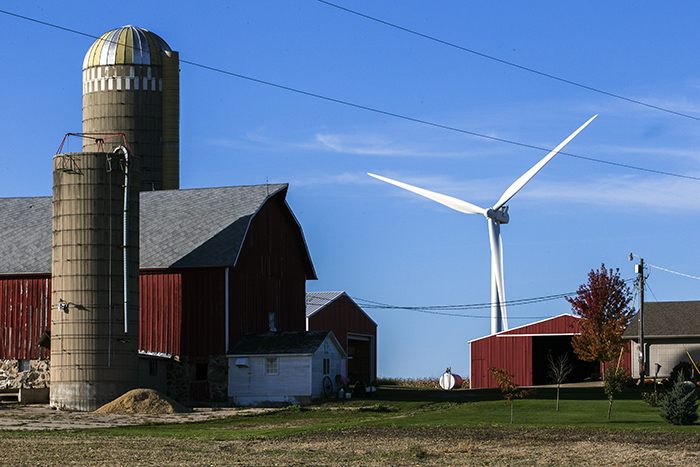Story Queue
Conflicts of interest abound in wind farm proposals
By Emily Le Coz & Lucille Sherman
GateHouse Media | Dec. 13, 2017
Elected officials affecting the fates of wind farm developments in their communities often stand to benefit personally from the projects, raising concerns about conflicts of interest.
In counties and towns across America, government officials or their family members hold private land agreements worth anywhere from a few hundred to tens of thousands of dollars should the projects develop.
Ethics laws vary from state to state, but many require only that elected officials disclose their personal interest in a project, not abstain from voting on it. In community after community, these leaders vote to advance wind farms even as they stand to profit personally.
Chicago-based Exelon signed lease agreements with 10 Michigan landowners serving as elected officials in two communities where it proposed a development, public records show.
Those officials, from Bridgehampton and Marion townships, then voted favorably on ordinance amendments and an overlay district to advance the $250 million Michigan Wind 3 wind farm, meeting minutes show.
The actions did not constitute a conflict of interest, officials from both townships said.
“The board did everything legal,” said Arnold McVittie, who was Marion Township supervisor until March of last year. “We consulted with our attorney, and we did everything by the book.”
Planning Commission Chairman Mary Bokach said the conflict of interest applied only to land-use approvals, which the board did not vote on, according to December 2015 meeting minutes.
Exelon’s project stalled after residents in both townships overturned the zoning amendments in a pair of August 2016 referendums. Exelon had sued Bridgehampton that same year to force a vote on its request for a special-use permit, but it lost the case.
Florida-based NextEra Energy signed land deals with a trio of elected officials in nearby Ellington and Almer townships in Michigan, where it planned to develop the Tuscola III wind farm, public records show.
At least one of those officials, Ellington Supervisor Duane Lockwood, helped pass an ordinance amendment to advance the wind farm, according to minutes from a January 2015 meeting.
Lockwood recused himself from further action after community members complained, but he told the local newspaper he saw no conflict of interest.
“I have leases, and that’s my own business,” The Tuscola County Advertiser quoted him as saying in March 2016.
Voters voted Lockwood out of office later that year, along with the other two officials – Almer Township Supervisor Jim Miklovic and Trustee Michael Putnam. Miklovic and Putnam had recused themselves from wind-related decisions, minutes show.
Newly elected township officials later voted to block the wind farm, prompting NextEra to sue both communities. A federal judge ruled in favor of one of the townships in November; the other case is still pending.
In Kingman County, Kansas, two county commissioners voted on a special-use permit for Flat Ridge 2 Wind Farm while having leased land to the project, county minutes show.
The commissioners – John Steffen and Earn Reno – also previously received lease payments from the project’s owner, London-based BP, a 2010 Kansas Ethics Commission document shows.
The Ethics Commission found no conflict of interest in the decision.
The 294-turbine wind farm started operating in 2012. It is the largest in Kansas.
Several wind developers, including NextEra, told GateHouse Media they follow all applicable state and local laws regarding lease agreements and conflicts of interest.
Others, like Invenergy, include contract language requiring public officials with lease agreements to recuse themselves from voting on matters relating to the wind farm. If they can’t recuse themselves, they must at least announce the existence of the agreement.
Conflicts of interest concerns were so rampant in New York that then-Attorney General Andrew Cuomo launched an investigation into two offending companies that culminated in the creation of a Wind Industry Ethics Code in 2008. The code prohibits conflicts of interests between municipal officials and wind companies.
It also requires wind companies to report the names and financial interest of any municipal officer with a lease.
In the years since that mandate, firms have reported numerous such leases worth millions of dollars in personal interest combined.
Spanish utility giant Iberdrola, a prolific wind farm developer, has since disclosed contracts with at least 41 different New York municipal officials or their family members worth nearly $9 million combined.
The company asks all municipal officers who stand to profit personally or through a family member to recuse themselves from voting on project matters, said its spokesman Paul Copleman.
Among those Iberdrola signed up were a dozen elected officials in Lewis County with contracts totaling $7.5 million for the Maple Ridge Wind Farm, jointly owned by EDP and Iberdrola. That project became operational in 2006, two years before the state law took effect.
A town board member in Hopkinton, New York, also has a family member with a lease for the proposed North Ridge Wind Farm, an Iberdrola document shows. That board member, Gilbert Sochia, has recused himself from voting.
Other states have tried to pass similar measures.
Legislation introduced earlier this year in Indiana by Republican state Rep. Tom Saunders would have created conflict-of-interest disclosure requirements for wind companies that sign leases with government officials.
Saunders said his bill came at the behest of constituents who discovered their own local officials held lease agreements with companies trying to develop in the area.
The measure also would have established minimum distances between wind turbines and properties, and it would have required voters to approve all wind projects before they could be built.
The measure died, but Saunders said he will introduce similar legislation next year.
“When you have county commissioners and planning commissioners making decisions about whether to allow (wind farms) in your county – and then they financially benefit from them – the perception to the public, is who are they looking out for?” Saunders said.
